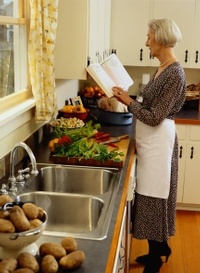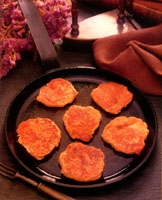| |

Traditions, folklore, history and more. If it's Irish, it's here. Or will be!
"People will not look forward to posterity who never look backward to their ancestors."
-Edmund Burke




Quotes
Library: Books, Movies, Music
Prints & Photos
Poetry
Jokes


Shops Ireland
Bunús na Gaeilge
(Basic Irish)
Circle of Prayer
Blessings
Did You Know?
Himself/Herself
Write to Us
Readers Write..
Links/Link to Us
Advertise with us
Awards & Testimonials
Submissions Guide

Help keep us free
Throughout the site you will see many items available for purchase from well-known merchants such as Amazon. Not interested in what we're featuring? It doesn't matter. Click on any link and then shop for whatever you wish - we will still get credit, if you buy something.
Thanks for your help.
|
|
|
A Taste of Ireland: The Potato
by Bridget Haggerty
Ask anyone to name the one food they most associate with the Emerald Isle, and nine out of ten people will say the potato. Today, Ireland's inhabitants consume more potatoes per capita than any other country in Europe or the United States - more than three hundred pounds a year for each man, woman, and child. What may be surprising to many readers is that the potato didn't exist in Ireland until the end of the 16th century.
A perennial plant of the Nightshade family, its widely swollen underground stem or tuber is believed to have originally been used as a vegetable in the Andes Mountains of South America. After being introduced into Europe it was brought to North America and from there, it was taken to the British Isles by the English. Ironically, it is thought that the blight which caused the potato crops to fail and which ultimately led to the Great Famine, came from the United States.
Given the grim circumstances that were forced on the Irish by a heartless English government, families enthusiastically embraced and grew a crop that yielded more food per acre than anything else they knew of - the potato. It was cheap, it was nutritious, and they ate it three times a day -washed down with milk when times were good or with water when times were lean. In a single year, and under ideal conditions, one acre would provide the average family with what it needed to survive. Survive is the key word. In just a few years after it was introduced, without the potato to sustain them, a family could starve.
In 1845 the arrival of the potato blight in Ireland was reported in the Dublin Evening Post. Much has been written about the Great Hunger, and while the catastrophic crop failures that occurred between 1845 and 1850 were incredible disasters, they were simply the straw that broke the camel's back. For decades beforehand, British rule had set in motion a vicious cycle that saw greater and greater dependence on the potato at a period in history when the concept of crop rotation was still far off in the future. Potatoes were easy to grow, they didn't take up much space, and, because they didn't take up a lot of time and labor, families were able to provide food for their own table while pursuing other endeavors to pay the rent. Eventually though, continuous plantings of one potato crop after another wore out the land, and in time, it was the only crop that would grow on the miserably few fields the Irish were allowed to cultivate for their own use.
One has to wonder how the course of history might have changed if the potato had never come to Ireland. One writer theorizes that it was directly responsible for the defoliation of the Irish landscape. It's a vegetable that requires water and heat to cook, and in areas where turf wasn't readily available, the woods were cut down to provide fuel for the fire. Other writers, including this one, wonder at the close relationship that still exists between the Irish people and something that was the cause of so much suffering. But then, one has to remember that the Irish race, while known for their poets and romanticists, are also practical, common-sense people. It might have been a blight that caused the potato crop to fail, but it wasn't the potato that caused the famine.
Addendum: My publisher and good friend, Ethna McKiernan of Irish Books & Media, read this article and suggested that I include a couple of recipes. She's absolutely right!
When I was growing up, the most popular way to serve potatoes in our family was in their "jackets." If the spuds were new ones, my mother would put them into water that had already come to a boil and simmer them gently until they were fork-tender. On the other hand, regular potatoes were always put in cold water. Of course, leaving the skins on the potatoes helped to preserve the nutrients, but that wasn't the primary reason our family preferred them that way - it's simply that they tasted so much better. Any left overs, which was seldom, were always put to good use by my dad who made the best potato cakes I've ever tasted. I really regret not getting his recipe because I've never been able to quite duplicate them; however, the recipe that follows is pretty close to the original. I should also mention that the most common name for an Irish potato cake is Boxty.

Ted O'Flaherty's Potato Cakes
Ingredients:
About 2 cups cooked potatoes
About 1 to 2 cups flour
1/2 teaspoon baking soda
1 to 1 1/2 cups buttermilk
pinch salt
Bacon grease or butter.
Method:
Mash potatoes and warm them up in the oven or microwave
Mix potatoes with flour, baking soda and salt
Add enough buttermilk to make a stiff batter
Heat a large skillet (iron is best), then add bacon grease or butter
Drop spoonfuls of the batter into the grease to make large or small cakes - whichever you like. Serve immediately with butter.
Another family favorite was roast potatoes. My mother peeled white or "old" potatoes, cut them in half and par-boiled them until they were almost done, but still firm. She then added them to the pan in which the Sunday joint was roasting. I might add that she also put in parsnips which resemble potatoes when they're roasted. My brothers and I hated parsnips and invariably, one or two ended up on our plates! Since we served ourselves, it was the rule in our house that anything you took, you had to eat. I can tell you there were many pinched noses and groans when we discovered we'd made a mistake!
For more on the potato, please click The Year of the Potato.
And for our many recipes click Potato.
Any purchase made helps to support our site (although we can't see potatoes helping too much). Thank you.
|
|
Sun, Mar 4, 2018
|
"...the freshest of food and
the oldest of drink"
- Irish Proverb
|
|
|
The New Irish Table
by Margaret Johnson

Margaret Johnson’s love of Ireland permeates page after glorious page of mouthwatering Irish dishes, from Smoked Salmon Chowder to Raspberry Buttermilk Tarts. Lavish color photographs of the food, the landscapes, and the people are woven through the text, making The New Irish Table the next best thing to sitting down to dinner in Ireland itself.
Click here for New Irish Table.
|
|



